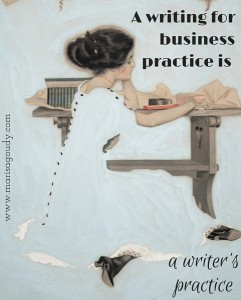Sovereign Standard, Issue 28 An editorial calendar is nothing; a writer’s practice is everything.
An editorial calendar is nothing; a writer’s practice is everything.
I kind of stole that from Ike.
 “Plans are nothing; planning is everything.”
“Plans are nothing; planning is everything.”
President Eisenhower was likely talking about the planning process required for taking a beachhead or running a country, but his statement encouraged me to think about blogging and writing for your business in a new way.
[tweetthis]Making a plan for your #blog is nothing. The #writing process is everything.[/tweetthis]
Making a plan for your blog is useless. The writing process is everything... When the coaching industry exists to sell you strategies and organization tips, this sounds like heresy, but editorial calendars are meaningless to me - and I bet they’re pretty useless to you too.
Forget editorial calendars. Writing is sustained by practice (and, well, writing).
I write and support writers for a living, but I have never had an editorial calendar.
[tweetthis]An editorial calendar is nothing; a writer’s practice is everything.[/tweetthis]
I’ve started plenty of spreadsheets called “editorial calendar.” I’ve listed publication target dates on the left side and created columns with important headers like “title,” “category,” and “call to action.”
And then… I’ve never gotten past the first entry. Six months later, inspired by advice I’ve given to my own clients, I try all over again (sometimes I even remember to just copy and past the old, useless calendar).
Invariably, however, I fall back into my old “no-plan plan.” And the writing still gets done.
Why do I do it this way? Because it works.
Does it work because I’m a born writer who thrives on chaos rather than organization?
Nope.
It works because I’m dedicated to my writing-for-business practice. And it’s not the sort of practice that you can outline in marathon sessions every few months.
The writing-for-business process is the very process of being a business owner, a thinker, and a writer. And it happens in its own time, according to what you’re learning and how you’re growing in real time.
What is a Writing-for-Business Practice?
To be a professional who writes to support your business, you have to sit down and put words on a page - but it’s about so much more than that.
To have a real writing practice that works, that actually supports and furthers your professional goals, you need to invest yourself in the entire process from generating and channeling ideas to publishing and sharing your content.
You don’t need to follow anyone’s specific framework or keep track of your progress according to any set form, but you do need to understand your own process well enough to replicate what works so you can publish according to your own schedule, week in and week out.
5 Key Elements of a Business Visionary's Writing Practice
This list isn’t exhaustive. The writing practice - even when it’s for business rather than pure creative expression - it’s a fiercely personal endeavor. You can make it as simple or as complex as as you are.
After five years of writing my own professional posts and helping many clients develop theirs, here’s a bit of what I know must be part of your practice:
- Curiosity - You look for the layers of the meaning in the every day.
- Storytelling - You see the potential plot lines, themes, and characters in your seemingly mundane experiences.
- Dedication - You show up to write regularly, even when life and “real” work want to get in the way.
- Tenacity - You keep writing and publishing even when no one seems to be listening (keep at it, produce well-made, fascinating content and, eventually, people will read, share, and take action).
- A recognition that writing is its own reward (at least at first) - The process sustains you and you’re able to see the benefit in organizing your thoughts and becoming a stronger writer - even before the loyal following shows up.
The Writing-for-Business Routine
Above, I say that the writing-for-business practice happens in its own time. That’s true, but in order for it to be a practice, it has to have a reliable enough rhythm.
Here’s the flow of my writing routine when it comes to producing weekly blogs:
- take notes consistently (the notebook goes everywhere and scraps of ideas get written down because there’s no telling what will grow into something big and important)
- draft the post on Tuesday and Wednesday
- edit on Thursday
- format and schedule it in WordPress before bed on Thursday night
- read it all over just once more just before it goes live on Friday morning
One writer’s process is just that - one writer’s process. I wouldn’t assume to tell you this is the best schedule to follow.
My weekly process shows you that even though I am free of the editorial calendar, I am not without discipline and commitment. You may not be planning your writing weeks and months in advance, but you are planning to write every week.
Another important thing to note as you settle into a writing routine: give yourself time between “that would make a great blog post” and clicking publish.
Time heals wounds and it also exposes faults in logic, boring storylines, and egregious typos. You need some distance from your writing to see your blind spots, so don’t try to go from start to finish in one session.
A writing-for-business practice is a writer’s practice
 Gone are the days of the elitist “real writer.” There's no need to play the artist or the intellectual who separates herself from the hack and the profiteer.
Gone are the days of the elitist “real writer.” There's no need to play the artist or the intellectual who separates herself from the hack and the profiteer.
When you go to practice, you expect to see a coach there
I don't generally do sports metaphors when I talk about my writing coaching. (If you're the kid whose single basket during middle school YMCA basketball is still a point of pride for your poor dad, the coach, you'd avoid talking about sports too.)
And yet, as I talk about the importance of practice and the longterm commitments and implications of such a practice, it does feel like I'm asking you to get better at playing a game. And in order to really hone your skills, you want a guide and an ally to teach you new skills and refine your own natural abilities. You want a coach.
I would love to support you and help you discover a writing-for-business practice that you can sustain and that can sustain your business.
And if you’re someone who thrives on spreadsheets and long term visioning, I can even help you create and maintain an editorial calendar (just don’t ever ask to look at mine!).
Consider what the Sovereign Standard Writing Coaching Program can do for you.

